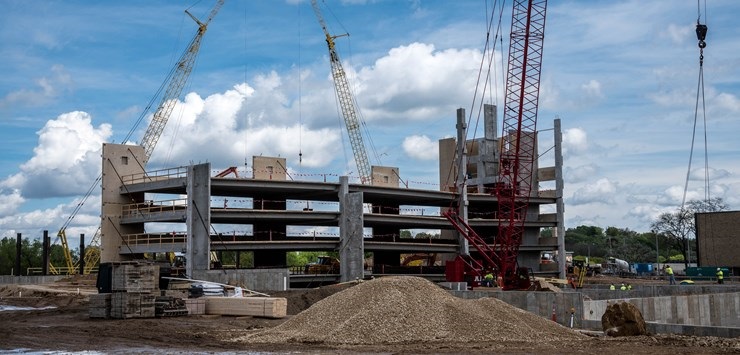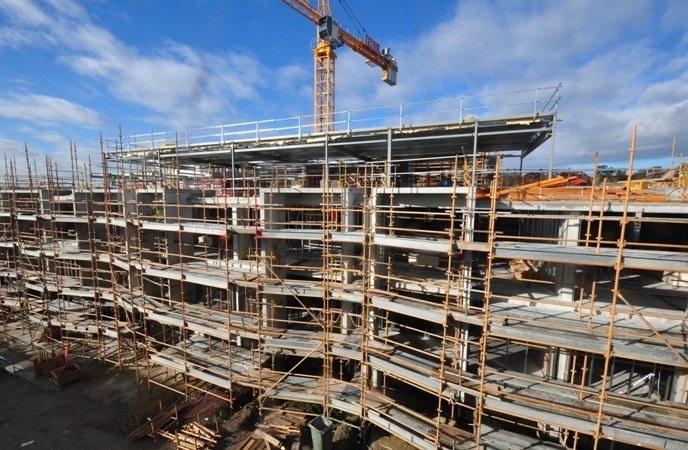The Novel Coronavirus COVID-19, has been declared a pandemic by the World Health Organisation, and is described by the OECD as the “biggest danger since the financial crisis” to the global economy. Unlike previous global health crises, the outbreak of COVID-19 is having immediate and far-reaching consequences because the global economy is now more interconnected than ever. Economic output has significantly slowed and the effects are being felt around the world.
The setback
Africa construction projects are being impacted by indefinitely delayed shipments of construction material due to the coronavirus. As a result of this, African contractors are said to be “sharpening up” on the terms of their contracts and the financial impact the virus is inflicting on projects in Africa.
Contracts typically are facing the risk of material delivery and delays on contractual completion times squarely on the shoulders of contractors. However, contractors may have a reprieve if their contracts have adequate provisions to allow for time extensions.
Cost implications of project delays
COVID-19 presents the very real risk of delays to project completions due to absences among staff and contractors, the potential for office and site closures and delays to the movement of materials. Resulting costs are likely to be borne by the contractor.However, when an event occurs that is beyond the control of the parties, they usually share the risk. The contractor would bear the monthly expense of being on site for longer than expected if there are delays, and the project owner would take the risk of other costs and expenses incurred due to late project completion.
To avoid delay damages, contractors need to ensure that they quickly identify possible contractual remedies and submit required notices in terms of their contracts, or they could find themselves losing millions due to the viral outbreak.
Construction contracts
While the Corona virus pandemic was unforeseeable, contractors may still be contractually responsible for delays or cost overruns on current projects, experts say. There are many terms that will be relevant to those discussions, including the various contractual terms relating to the contractor’s schedules, substantial completion, delays, liquidated damages and other contractual provisions
It is recommended to know exactly what is in each contract, and taking special note of any force majeure provisions that allow work to be suspended or terminated when certain extenuating circumstances arise. There may be some opportunistic claims, but the impacts of the Corona virus, particularly on the supply chain, are so broad that there has to be many valid claims.
Project financing
Lenders might be uneasy to finance construction projects because of the uncertainty surrounding the completion of projects. The lack of construction materials and labor might slow down the construction of ongoing projects.

Construction materials
Africa’s construction projects are being impacted by indefinitely delayed shipments of construction material due to the coronavirus. Contractors across Africa look to China for construction materials. But the Chinese government’s containment efforts and quarantines have slowed or shut down factories in dozens of the country’s cities and provinces, leading to forecasts of a sharp falloff in production of everything from including construction materials.
Travel industry
The travel industry has also been impacted by increasing reports about the spread of Coronavirus, raising concern among African travellers about travelling internationally.
Construction companies have also suffered a lack of access to skilled personnel from affected regions, who have been unable to travel to project locations due to travel bans, quarantines and self-isolation, and this will delay the completion of projects.
Labor
Construction companies across the world are facing shut downs to the outbreak with regards to maintaining their workforce as well as preventing the spread of the virus.
These shutdowns and bans mean that companies will need to turn to teleworking and other technologies to keep business running smoothly while employees are at home. However, these might not apply when it comes to construction sites because they need a physical presence; so construction of buildings or infrastructural projects might face delays.
Disruption of infrastructure developments
The coronavirus has been slow to take root in Sub-Saharan Africa (SSA), but the number of cases is now beginning to grow and the construction industry is facing disruption stemming from the China shutdown.
From imposing travel bans to barring mass gatherings and shutting down schools, governments across Africa are increasingly implementing comprehensive measures in a bid to control the spread of the new coronavirus. The emergency moves come amid a worrying rise in the number of infections registered in recent days across the continent after weeks of relatively few reported cases. As of 19 March, 33 African countries combined had reported more than 600 cases and 17 deaths due to the virus, 150 cases alone were reported in South Africa.
Amid the worsening situation with regards to the coronavirus outbreak, GlobalData has cut its forecast for SSA’s construction output growth to 5.4% in 2020, from 6.0% previously. Although the direct impact from the coronavirus has been limited to date, many countries in Africa are exposed to the knock on effects from the construction shutdowns in China.
In recent years, China has emerged not only as SSA’s largest trading partner but as a large and fast-growing source of aid and the largest source of construction financing; these contributions have supported many of Africa’s most ambitious infrastructure developments in recent years. As part of their increasing activity in overseas markets, Chinese companies have significantly boosted their engagement in Africa, covering a wide range of sectors. Africa is part of China’s ‘One Belt, One Road’ (BRI) initiative and with significant focus on coal and large hydropower projects.
The coronavirus outbreak presents a downside risk for short-term growth in the region, particularly in Ghana, Angola, South Africa, and Nigeria, which are reliant on China’s demand for their commodities exports. With mass production shutdowns and supply chain disruptions due to port closures in China, the effects are already being felt, while Africa’s access to industrial components and manufactured goods from the region has been hindered.

Being proactive rather than reactive
It is critical that construction companies be proactive rather than reactive in dealing with the coronavirus due to the fact that construction contracts typically contain force majeure or excusable delay provisions.
Obviously, the question becomes, would the coronavirus fall within the category of a force majeure or excusable delay event? It is not entirely clear given the novel nature of the coronavirus. Therefore, it is not recommended that construction companies count on relying upon such force majeure or excusable delay provisions to shield them from liability for delays and disruption in their work or their failure to complete their work within the time specified in their contracts. Instead, construction companies should try to minimize those delays, disruptions, and failures by taking the following recommended steps:
1. Define – identify the company’s main vulnerabilities (convene a meeting with senior management and decision-makers to identify potential impacts on the company).
- Key Considerations
- What are the company’s most important business activities and processes that need to be protected and which people are responsible for them?
- Who are the company’s most important subcontractors and suppliers?
- What are the company’s most important materials and equipment?
2. Assess – understand if and how the company is prepared to deal with the company’s main vulnerabilities (review any existing plans and procedures to ensure they are current and begin preparing business continuity and crisis management plans and procedures aimed at minimizing potential impacts on the company).
- Key Considerations
- What policies and initiatives should be reviewed to mitigate further impacts on the company?
- Are critical activities and processes covered by existing plans and procedures or do new plans and procedures need to be implemented?
- Are critical subcontractors and suppliers prepared to respond?
3. Implement and Manage – ensure the company’s plans and procedures work (work with senior management and decision-makers to establish and embed response and recovery arrangements and confirm senior management and decision-makers understand their roles and support how the plans and procedures will be used).
- Key Considerations
- Who should be the company’s teams as far as planning and responding are concerned?
- How will the company monitor the continuing effects on the company’s most important business activities and processes?
- At what point does the company anticipate recovery arrangements will need to be invoked?
4. Communicate and Remain Vigilant – ensure the company’s teams are informed (assign clear responsibilities for internal and external communications).
- Key Considerations
- What methods are needed to provide ongoing communication and monitoring of the situation?
- Which decision-makers need to be contacted and informed and when?
- Which subcontractors and suppliers need to be contacted and informed and when?
- Who will be responsible for communicating major developments both internally and externally?
- How will the company continue to protect staff and key material and equipment?
Additionally, to prepare for upcoming events, construction employers and contractors should also:
- Check current contracts to determine whether they include clauses relating to government intervention and force majeure;
- If no such provisions exist, a contractor should open a dialogue with the client to determine whether the contract can be varied to include a mechanism to deal with any events and delays associated with COVID-19;
- Maintain high levels of hygiene on sites and in offices;
- Monitor government guidance;
- Prepare for home-working where possible;
- Put in place mechanisms to maintain communication with staff should the outbreak escalate to the extent that work spaces are forced to close.
In the long run, the extent of the impact and damage is tied to the time it takes the world to contain this virus. If the global community can contain the virus and a successful vaccine developed, the global economy may recover before the end of the year and businesses may be able to make up for lost revenue during the period of the pandemic. If, however, countries are unable to contain the virus, and no vaccine is developed soon, the spread of the virus will rise significantly. According to the World Bank, a serve pandemic could result in a 5.0% decline in global GDP.
Experts fear that should the effects of the virus continue to cause economic disruptions, the world may end up losing all gains financial markets have made in the past decade. The plunge in the markets caused by the coronavirus has been unprecedented in the past decade, in fact, the last time such a global bear run was witnessed in the world was Black Monday during the 1987 financial crisis. The emergence of China as a superpower in the world has seen it play a crucial role in the global supply chain and its economic slowdown as a result of the virus has adversely affected the global market. The fix for the developing recession is governments of respective countries to use tools in their disposal: monetary and fiscal policies, to ensure the local economies are stimulated through expansive policies and look for local substitutes of imports from nations such as China.
Also read: $1.5bn Nigeria rail project procrastinate due to Covid-19 outbreak



